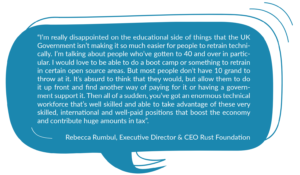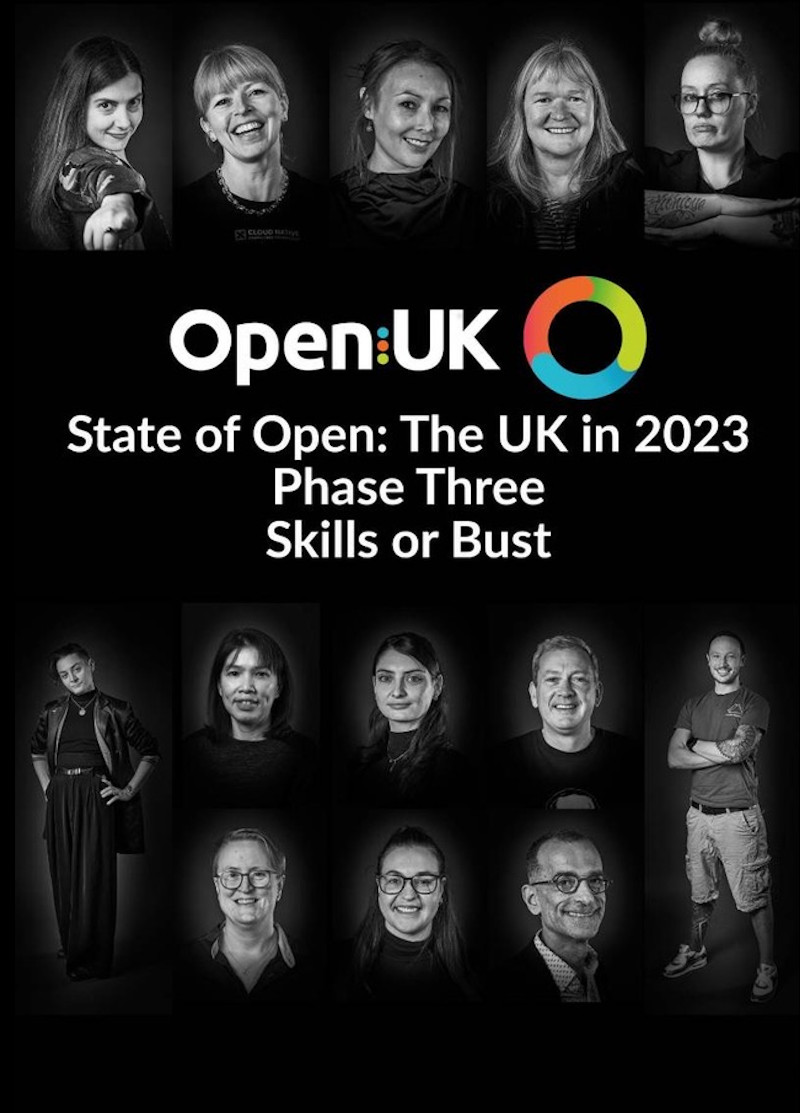
State of Open:
The UK in 2023 Phase Three “Skills or Bust”
Download the full report Watch the documentary
“Being on the State of Open Con advisory group has felt like the concept of the big society in action. It’s been said that a small group of committed individuals can achieve great things, and this experience has shown they can also be achieved swiftly and efficiently!
The Open Source community in the UK is committed and action oriented. They understand that progress in creating secure and accessible software will be made by bringing players together from across the technology ecosystem. It is impressive to see corporates and startups, engineers and policymakers engaged with a common purpose and each making a valuable contribution. Open UK plays an important role bringing a range of
experts together and supporting a set of principles that unite around a shared vision. Our involvement with Open UK has benefitted participants in our programmes and is seen through the innovations they create.”
Amanda Kamin, Chief Marketing and Communications Officer, Digital Catapult
Cover Photos
Cover photos are from our collaborator photographer Tiana Lea, who took 38 portraits for the OpenUK State of Open Exhibition sponsored by Arm . We are grateful to Arm for their continued support of this work and will continue to document the people forming the UK Open Technology community in this way. Full list of cover participants at 8.8.
1.2 Introduction – Bringing the Open Source Submarine to the Surface
2. The UK’s Open Source Workforce
2.1 GitHub information in 2023
2.2 Where is the UK’s Open Source community based?
2.3 Spotlight on Developers
2.3.1 Spotlight on Liz Rice
2.3.2 Spotlight on Mike McQuaid
2.4 Analysis of UK Contributors and their Contribution
2.4.1 Making a first code contribution
2.4.2 Increasing contributor numbers
2.4.3 The level of commits by UK’s community of contributors
2.4.4 Companies contributing through UK employees
3. The OpenUK 2023 Survey outputs: Skills
3.1 ICT Professionals in the UK
3.2 Recruitment, the Global financial crises and the tech sector reaction
3.3 Shifting Skills
3.4 Types of Collaborations as Benefit of Open Source Software
3.5 The Public Sector need – skills and curation
3.6 Inbound talent, Brexit and Diversity of talent pool
4.1 Thought Leadership: Understanding the ‘how’ of Open Source careers
4.2 Thought Leadership: Unlocking the Power of Tech
5. The Role of Open Source Software in the UK tech Sector
5.1 Why does the UK create brilliant people but has not built an effective tech sector?
5.2 What makes the US Successful?
5.3 UK Skills gap and reliance on the US
5.4 The advantages of and need for suitable Geographical Hubs in the UK
5.5 The potential for UK growth through Open Source software skills
5.6 Remote working
5.7 International employment
5.8 Connectivity and impact on rural locations
5.9 Culture and Employment
6.1 Civo
8.1 Contributors
8.2 About the Creators of this Report
8.2.1 OpenUK
8.2.2 Symmetry
8.2.3 Runa Capital
8.3 Methodology
8.4 Acknowledgements
8.5 References
8.6 OpenUK Survey 2023
8.7 Sponsors
8.8 Cover Photos
1.1 Executive Summary
This Phase builds on Phase Two’s focus on enterprises, to spotlight UK-based individuals forming the globally-employed Open Source Software workforce. Building on the concept that Open Source Software is the “submarine under the digital economy”, it is the first report to seek to understand this workforce and will be repeated annually. Considering who they are, what they do and how they work, it’s an expose of those in the Submarine that contributed 27% of UK Tech Sector GVA in 2022.
Analysed GitHub data reveals the 31,800 UK contributors and maintainers. This data will be collected and analysed quarterly building a detailed understanding of the UK’s Open Source community and workforce in future reports – a picture that no other country in the world has. Future reports will also analyse the impact of OpenUK’s work in bringing new contributors into the Open Source Community and the potential for this to enable their hands on experience and skills development, how it supports the build of their CVs and careers with global tech to enable a future UK tech sector with the right skills and a more diverse face.
There is a significant potential impact of leveraging Open Source contributions to enable the UK to retain talent through growing their practical experience from the UK and allowing hands-on exposure to the global tech sector via Open Source project contribution from the UK thanks to adequate connectivity across the country. This potential to develop missing skills, build a comprehensive public profile and to utilise remote working for international companies as a tool to stem talent flight is significant.
It will increase the level of contribution to the UK economy, foster cutting-edge skills within the domestic talent pool, and cultivate a cohort of UK-based individuals in international software development. In addition to its potential to address immediate skills shortage it may lay foundations for future entrepreneurs to found and lead innovative tech ventures.
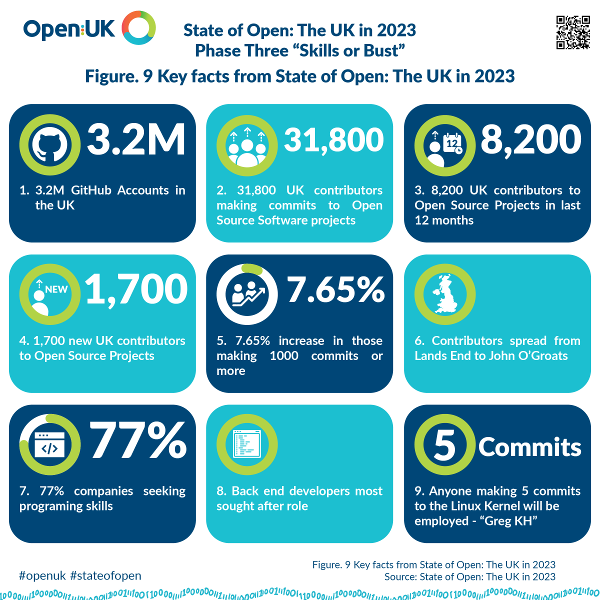
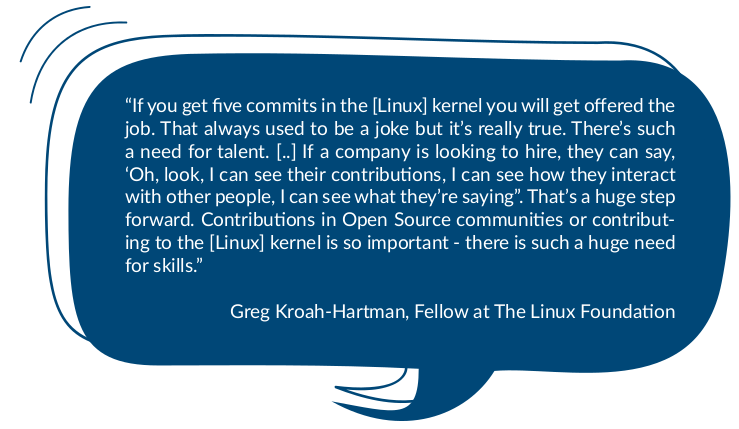
1.2 Introduction – Bringing the Open Source Submarine to the Surface

Amanda Brock
CEO
OpenUK
Open Source Software is the Submarine under the Digital Economy in the UK and globally. It underlies all of our technology ecosystems whether the internet, cloud, AI and ML or blockchain. It is the plumbing and plumbers’ tools of our digital infrastructure. The people who crew that submarine are based across the globe and work collaboratively across geographical borders irrespective of geo-political shift.
Having focused on the economics of Open Source in Phase Two of this State of Open: The UKin 2023 report, and the UK companies powering the submarine, in this Phase Three the focus is on the people who crew the submarine – the UK’s Open Source Software contributors. These individuals are often home working, many if not most, are internationally employed and they often contribute to Open Source Software projects as part of their employment and also in their personal time.
Who are these people?
Despite forming a substantial part of the UK Tech Sector, contributing 27% of its GVA in 2022 [2] , the UK’s Open Source Software contributors have been invisible to their home country.
Frequent international travellers, they come together with others in the same Open Source projects and ecosystems across the globe. They are likely to work with and have strong relationships with global colleagues but may well not know their geographical neighbours from the locally facing UK tech sector. In the same way as the Open Source Software companies were seen in Phase Two to be often ignored and unrecognised the individuals are frequently missed by the UK. (This is not specific to the UK but common across all countries outside the US). Some have previously lived in and returned from the US, whilst others have made a conscious decision not to move there. Most, if not all, would be easily employable in the heart of the tech world – the Bay Area. At the same time this UK community would have been much bigger but many left as part of the talent flight to the US we are all too familiar with. Those who are UK based are able to be as Open Source companies hire globally based on skills not location.

The UK government has been clear that it aspires to the UK being the next “Silicon Valley”. There’s no doubt that the Bay Area sets the pace for the tech sector, challenged only perhaps by China. The UK will have an election next year but despite that we can be certain that building a successful tech sector and digital economy will be the basis of the UK’s future policies and central to the growth of its economy. UK Tech Sector growth will be high on the agenda of any future government.
If the UK is to be successful in building this future tech sector, it must get to know its Open Source Software Workforce – the crew of the Open Source Submarine. They are already a part of that Bay Area workforce the UK aspires to – part of the International tech sector workforce – despite their UK residency. Apparently invisible to the UK, they have been building the most cutting edge and innovative technology with their colleagues and employers in the Bay Area for a decade plus. This will bring high salaries into the UK through that international employment to boot.
This group of contributors understand how the Bay Area’s tech sector works…they are a part of it.
Whilst the UK’s Open Source leaders, individuals and community as a whole may not be known and recognised in the UK, in the Bay Area, amongst its venture capitalists and tech companies UK community are well known and they are much sought after as employees.
Although many of them are based around the UK’s urban conurbations equally many live in remote areas, part of rural communities where their salary levels have even more impact on the rural community even than on urban areas. So long as they have good connectivity and access to international travel routes they can live anywhere.
Not just engineers and developers but broader contributors
The workers in the Submarine are primarily but not solely engineers and developers. They also include a community which is not captured in this report’s analysis of code contribution, those who provide the non coding skills – the community leaders, managers, and governance people. Sadly not enough of the UK crew are the people who commercialise Open Source and develop products and go to market strategies (something that remains in the Bay Area WheelHouse and a set of skills which must be cracked by the UK workforce for the UK to be successful in its future goals).
In my own case I can’t code. But my contributions in the last few years in community building and leadership, governance and skills and policy and advocacy of Open Source Software, have been significant. Like those contributing code much of this is done in my personal unpaid time. There are many, many others in the UK and a pool of deep experts in this international recognised and world leading community. Number one in Europe by number of developers and lines of code contributed.
Democratising tech and the community building it
Open Source Software democratises technology by giving users access to the human readable source and allowing collaborative development and competition. However, it also democratises technology by offering opportunities to contribute and to skills development. IN turn this enables access to employment through contribution. Anyone with the skills can join a project and its community. They are able to contribute so long as they comply with the project’s rules/governance, including codes of conduct or respect. Their contributions will receive feedback and possibly mentoring and their personal skills should develop and improve over time. Thus practical experience can be gained by contribution to Open Source despite an individual not having a job in this space. This allows skills development.
Individuals are able to join a Project with a basic knowledge of a skill they wish to develop and the opportunity to hone that skill through the act of contribution to the project. This contribution is public and creates a visible learning path and effectively creates a living CV via the project and repositories like GitHub and Gitlab. Companies which use the particular project often employ individuals from the associated communities based on these visible contributions. Their contributions to Open Source projects allow these individuals to find jobs with not only UK but international employers who use the code.
Growing this community will build our tech future
How can the UK achieve its tech ambitions? It simply will not without significant change. That change will require a greater understanding of those crewing the Open Source Submarine who are already integrated into the very Silicon Valley aspired to.
What needs to be done?
To achieve this OpenUK is currently undertaking three activities where it brings its skills in this global Open Source Submarine to bear.
1. Building the Diverse face of a future UK Tech Sector
OpenUK is actively engaging three groups:
1. Individuals who have been taught relevant coding languages like Go, Rust, Python and Javascript.
2. Mentors from across the UK’s contributing Open Source Software community.
3. Projects which commercial entities consume and participate in which use those languages
Offering mentorship to those wishing to grow practical skills to support their understanding of how to contribute to Open Source Software, working with Projects which have agreed to accept a scale of contribution from newbies and to support the evolution of their skills, this will enable individuals educated in coding languages to participate in the build of a future UK Open Source Sector that is diverse and accurately reflects our society.
OpenUK will track the progress of individuals engaged and where this support leads, whether they become part of a community and if so whether they go on to become employed using these skills or in that community and how their careers develop as a result of this. This data will also be shared in annual reporting and will include EDI in future.
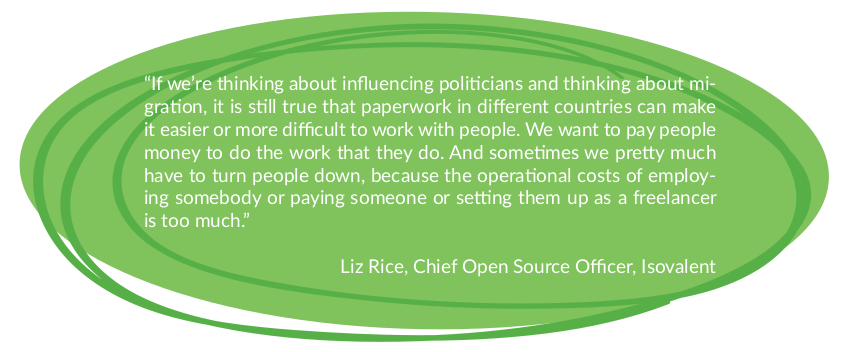
2. Building missing skills in commercialisation
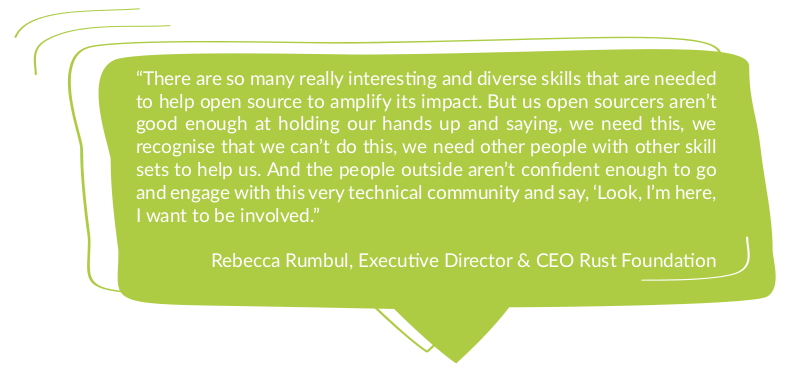
Recognising that there is a need to build commercial understanding of Open Source Software in the UK and beyond we will continue to educate through our activities like State of Open Con keeping participation prices low and offering free places to young people/ students, the unemployed and community contributors and will continue to include tracks on career development and entrepreneurship along with technical, legal and policy content. Content from this and many past OpenUK training activities is freely available for download.In addition we are working to build a Massive Open Online Course in the Business of Open Technology. This will be available to all.
3. Honouring the UK Code Contributors
We have honoured almost 300 individuals in the UK to date with OpenUK’s New Years’ Honours. This year we will be honouring the top code contributors to Open Source Software as found on GitHub, allowing us to analyse and engage with this wider group of individuals to understand them better and to engage them in the mentorship process.
As we build and manage our future Open Source Submarine Crews, we hope to see a whole fleet of Open Source submarines in the future, supporting the UK’s aspirations to become the next Silicon Valley.
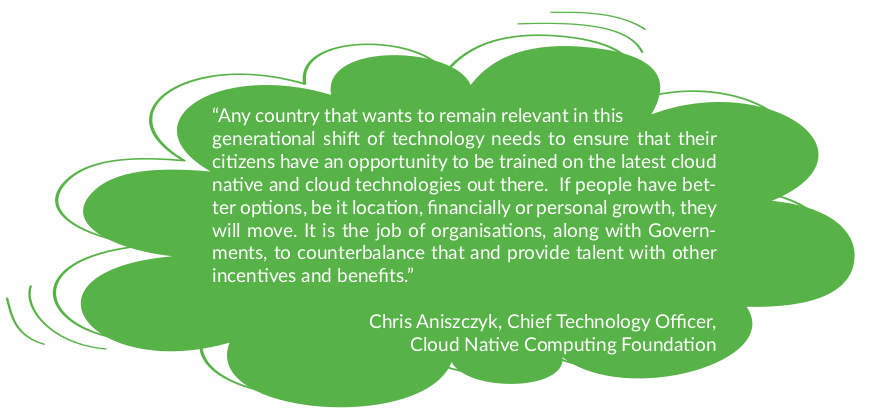
2. The UK’s Open Source Workforce?
Who fills the Open Source submarine under the UK’s digital economy? For many years research into the developer community and contributions into Open Source software have relied heavily on the developer data captured by GitHub to understand the contributing community.
2.1 GitHub information in 2023
We shared in Phase One that the UK had 3 million GitHub accounts, and today that is 3.2 million, with almost 200,000 new accounts since March. At 4.5% of the UK population that remains more per capita than any country in the world. But who are these people, where are they based, and who employs them?
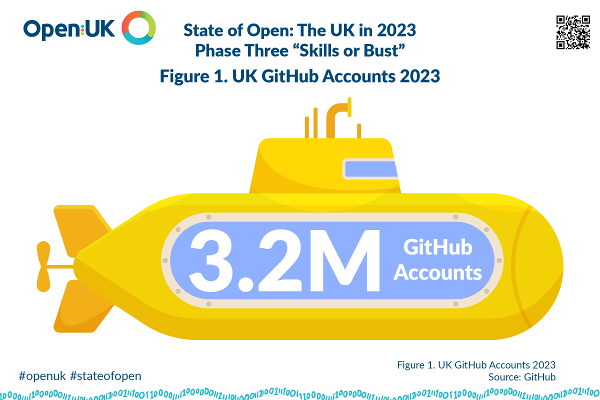
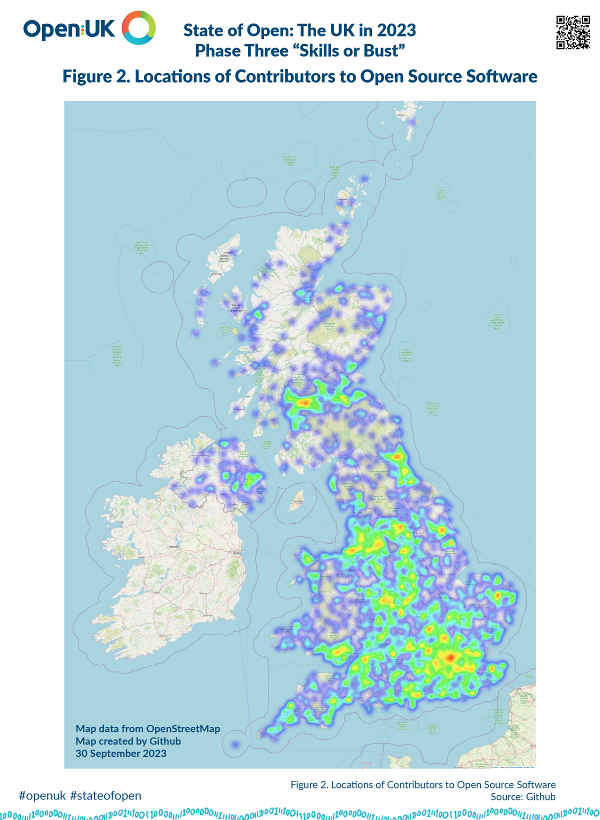
2.2 Where is the UK’s Open Source community based?
The heatmap at Figure 2 shows the locations of the developers holding GitHub accounts across the UK. We see from this that there is a spread across the UK
2.3 Spotlight on Developers
OpenUK has celebrated the UK’s Open Source development community since its inception and recognises contribution to Open Source Software. Here it shines a spotlight on a couple of key contributors to understand more about their lives and work.
2.3.1 Spotlight on Liz Rice
 Chief Open Source Officer
Chief Open Source Officer
Isovalent
Liz, an avid user, contributor and maintainer of Open Source software, has been a part of the Open Source world since 2016. As a champion and pioneer of Open Source she has been able to build an impressive career for herself and encourages others to follow suit. Consistently she speaks about the multiple benefits of Open Source including its ability to enable and support international remote work – resulting in tangible opportunities for both individuals hoping to make a career for themselves in the industry and companies wanting to onboard quality talent. Her experiences and journey highlight the ongoing and evolving nature of the Open Source sector.
Opportunities for individuals
Liz started her career working in traditional on-site, in person teams but her interest in remote work was sparked after doing some consultancy work that involved visiting the client in person and then going away and doing work in her own office at home. She realised that this way of working, from her own home, worked wonders for her. This was viable due to the nature of Open Source and its flexible nature. Speaking about her first role in a remote team for an Israeli company she says, “My team was pretty distributed, which was quite unusual. The majority of engineering was based in Israel, but my team had really two or three people from Israel and
somebody in Poland and somebody in Canada – we had a bit more reason to be remote first, I will say the company was split between the US and Israel. There was a pretty strong culture of having remote meetings, accommodating people’s time zones and all that kind of thing.”
The world of Open Source opened up this avenue, making international work accessible for Liz and continues to do so. Liz highlights the ease of this process, giving an example of the CNCF, “you can see, go online, find a group that’s working in an area that you’re interested in, or project that you’re interested in, and you can just join Zoom calls, work on things in GitHub, join the Slack channel.” Such an easy, fluid process opens up a vast array of new career opportunities for those trying to make it into the industry as well as providing a space for individuals to further their skills, making them more attractive candidates.
Opportunities for companies
Open Source doesn’t just boost the skills and careers of individuals, it is a vital tool for opening up the pool of candidates for companies. Having spent a couple of years in the Bay Area, Liz has firsthand experience of the limitations of hiring within a specific geographic area. While at the time (2010-11), Silicon Valley was thought of as an area packed full of talent, Liz explains that “we would find actually, particularly trying to interview people, you’d find people who come to the Bay Area, because the streets are apparently paved with gold, but they didn’t necessarily have the skills you were looking for.”
2.3.2 Spotlight on Mike McQuaid
 CTO and Co-Founder
CTO and Co-Founder
Workbrew
Since the beginning of his career, Mike has seen a very strong connection between his personal and professional ambitions and the world of Open Source. During his own personal development and journey, Open Source software and its way of working have allowed him to design his career in a flexible and unique way. As a maintainer of the Homebrew package for over 14 years, Mike is able to give us a holistic view on Open Source software within the UK and the wider ecosystem that surrounds it.
Between creating his first Open Source project, participating in Google Summer of Code, contributing on GitHub, and his involvement with Homebrew, Mike has gained a multi-dimensional skill set, from fixing bugs problems to leading many non-code project aspects. This includes setting up the governance, managing security, making new releases and supporting others in developing new features. Experiences such as these are transferable to other roles and to a variety of Open Source projects.
Mike believes that remote work and Open Source have gone hand in hand for him, allowing him the flexibility to work how and where he wishes. He emphasises, “I’ve worked from home for every job I’ve had for the last 14 years. I’ve had several jobs where I’ve moved house, or to a new city and maintained the same job. I learned how to do work remotely and across time zones through Open Source.”
The world of Open Source also brings about its own skill development, allowing people to specialise and develop what they are passionate about. Involvement with Open Source, even outside of your main employment tasks, furthers your career. “Open Source is a really good opportunity, even when you’re not actually writing the code, to review and read lots of other code by many other people with very different styles. It’s a chance to debug and fix problems in code you did not write. These are incredibly valuable skills in the workplace.” It was the work he has continued on Homebrew outside of his job responsibilities that contributed to his career, rather than just the work he was doing specifically as part of his everyday work requirements.
His own Open Source experience informed his involvement in the hiring process when working at GitHub for a decade. He always kept an eye out for individuals who had grounded knowledge and experience of Open Source. Like himself, this experience seemed to build individuals’ working styles to be more flexible, self-sufficient and successfully asynchronous. The process of working on Open Source projects, whether it be fixing a bug or writing new features, enables people to get involved with each project in a deeper and more detailed way and function in an Open Source development ecosystem, with its own unique ways of working.
Grit is a particularly valuable quality for UK engineering and developer talent. A good computer science degree is not required to have a successful career in tech – but can be a good starting point. With the high quality of universities in the UK and a breadth of available Open Source experiences, individuals have many opportunities to collaborate and learn on the ground. A big difference between the UK and the US talent pool is publicly expressed confidence. He notes, “We’re a culture where we are not very fond of bigging each other and ourselves up and saying when we’re great and doing something world class. It’s not seen as cool to aspire beyond your means – it’s seen as arrogant. This culture can be a little bit harmful.” We need to allow the strength of experience, the self-starter and self-sufficient working culture and the extensive opportunities offered via the vast development of Open Source in the UK to lead the talent to meet the requirements of the UK economy.
2.4 Analysis of UK Contributors and their Contribution
Working with data mined from GitHub on a quarterly basis, Runa capital has provided manually checked data to establish various facts about the UK’s Open Source Software contributor/developer community. The Runa methodology is explained in the footnotes. [3]
The information used in this report is based on the last 12 months of data from the start of Q4 2022 to the end of Q3 2023. The underlying data is now being captured and analysed quarterly by OpenUK and will be shared annually in a skills report to allow ongoing analysis and understanding of the UK contributing community and contribution.
2.4.1 Making a first code contribution
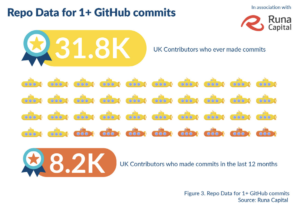
As of the end of Q3 2023, as can be seen in Figure 3, there were 31,800 UK-based developers who had made at least one contribution accepted into Open Source Projects (“commit”) and 8,200 of these have made a commit in the last 12 months.
2.4.2 Increasing contributor numbers
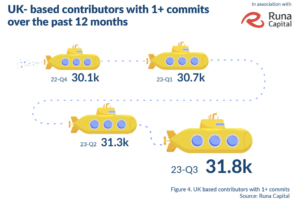
Figure 4 demonstrates the gradual increase in the number of developers who have had their first contributions accepted into Open Source Projects (“commits”) and its increase by 1,700 in the 12 month period to 31 October.
That means that 20.7% of contributors making at least one commit to an Open Source software project in that 12 month period have been first time contributors.

2.4.3 The level of commits by UK’s community of contributors
Analysing the community of Open Source contributors based in the UK (whilst acknowledging that this community is not static), an ongoing increase at the lower level of commitment is evident, whilst the number of contributors at a higher level has increased at a significantly slower pace, and in particular most slowly at the highest level measured.
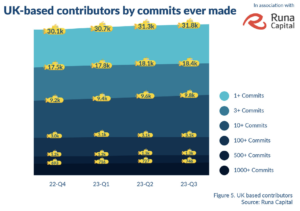
The increases in the number of developers making commits to Open Source projects at different levels between Q4 2022 and Q3 2023 as seen in Figure 5 (above) is as follows:
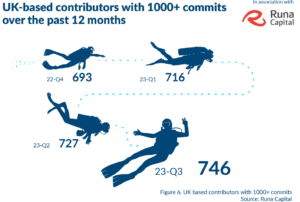
Those making 3 plus commits increased by 900;
Those making 10 plus commits increased by 600;
Those making 100 plus commits increased by 100;
Those making 500 plus commits increased by 100; and
Those making 1000 plus commits increased by 53.
Looking at the group making the highest level of commits – 1000 plus commits – this group of contributors is significantly smaller than at the lower levels. Whilst gradually increasing this increase is at the slower rate of 7.65%. The growth of this group of deep experts at a slower rate is unsurprising.
2.4.4 Companies contributing through UK employees
Companies across the globe, but particularly in the US employ talent based not on location but skill set in software engineering as it increasingly becomes Open Source Software.
As Microsoft’s Stephen Walli explained as far back as 2018, in his keynote address to the Linux Foundations’ Open Source Summit Europe [4] Microsoft has been on a journey to Open Source that all companies are on today. He attributes this to the need to be competitive in hiring developers in a digitalised world – all developers who have learned to code in the last 20 years have been taught to use Open Source software methodologies, so to be competitive in hiring them companies must allow them to use Open Source.
Secondly, to run a cloud business such as Microsoft’s Azure – as much of the public cloud is built on Open Source Software – requires not only use of Open Source Software but engagement in those Open Source software packages used.
Thirdly, there is specific code, packages or projects where innovation is only available as Open Source software and customers ask for it by name.
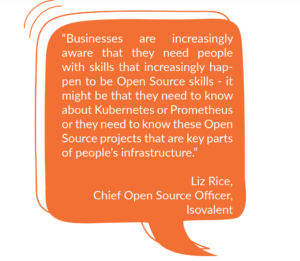
All of this not only influences companies on their journey to Open Source but also influences businesses hiring decisions and the skills required. Not always by design, companies are increasingly seeking Open source skills and is explored at 3.2 below.
EPAM’s research indicates 20 companies with contributions to Open Source code bases from contributors in the UK. Location data is notoriously difficult to retrieve from contributors as, in GitHub from which this data is drawn, the location field is not mandatory and it is represented in a string [5] . Still, getting a sense, however partial, of the breadth of contributions from UK-based contributors to code bases from these global organisations suggests the size of the Open Source community in the UK and the breadth of skills required [6] .
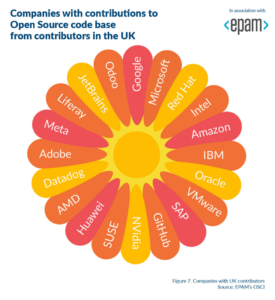
3. The OpenUK 2023 Survey outputs: Skills
3.1 ICT Professionals in the UK
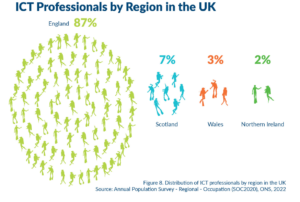
According to the latest data from the Office for National Statistics (ONS), there are more than two million professionals in the ICT sector in the UK, with almost 1.4m professionals in Information Technology alone [7] . There is a significant concentration of those ICT professionals in England with nearly 9 out 10 professionals (87%) in ICT (See Figure 8).
The 2022 People and Skills Report [8] , released by the now defunct Tech Nation and based on data from job search platform Adzuna, indicates that from May 2021 to 2022, technology-related jobs were the most sought after in the UK, followed closely by job opportunities in construction, teaching, and healthcare roles. The share of tech positions in the UK job market has risen to 14% from 11% in 2019. The increased need for tech-related products and services in the last couple of years has resulted in a significant rise in available tech jobs in the UK, hitting the highest point in a decade.
This reflects the 130% increase in venture capital investment into UK based tech startups and scaleups between 2020 and 2021 putting $41bn into the UK economy and creating employment opportunities. [9]
Considering this in light of our recent OpenUK report, The State of Open: The UK in 2023 Phase 2 Part One [10] , it’s apparent that access to funding or buyers from the United States for UK tech start ups can actually draw skilled professionals and talent away from the UK. This talent flight may be indicative of why it is difficult to fill the available jobs in the UK. Equally we must consider the ebb and flow in the software and digital labour market since 2021 and how this reflects on skill demand in 2023.
3.2 Recruitment, the Global financial crises and the tech sector reaction
The pandemic-induced shift to remote work acted as a catalyst for certain tech segments, leading to a surge in demand for collaboration tools, cloud services, and digital solutions. This trend, however, did not uniformly benefit all aspects of the sector. Startups face funding uncertainties, resulting in a nuanced employment landscape within the tech industry.
Techdigital transformation wave, experienced unprecedented growth, contributing to the overall dynamism of the sector. Yet, the economic downturn that followed triggered disruptions in supply chains and reduced consumer spending, impacting the tech sector and influencing employment trends.
Over the last 12 months, several large organisations in the tech and digital sector have implemented lay-offs as a response to economic uncertainties, shifts in market demands, and internal restructuring. The impact of the COVID-19 pandemic, supply chain disruptions, and changes in consumer behaviour have contributed to these decisions. After unprecedented growth during the pandemic, tech companies and the digital sector have faced uncertainties amid financial downturn.
And yet, according to our OpenUK 2023 survey [11] , programing skills are the most in demand Open Source Software skills in the UK. It is possible to interpret the high demand for programming skills as a sign that those who lost their jobs will find new employment. Complementary skills to this core function (production of software) are also in demand. Legal and administrative skills were the skills next in demand (both at 32%) after programming and other technical skills, while financial skills were the least in demand (9%).
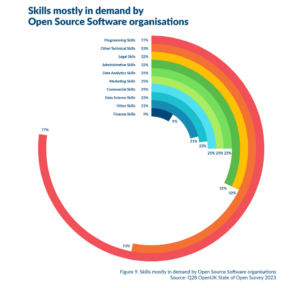
3.3 Shifting Skills
Gitlab’s report from 2021, A maturing DevSecOps landscape [12] , suggests a shift from 2020 in terms of skills with 30% of developers indicating that having knowledge of AI/ML is the crucial skill for their future careers, contrasting with the previous year’s figure of 22%, where it ranked second after skills such as communication and collaboration. While these remain significant, 18% of respondents highlighted their importance, along with proficiency in advanced programming languages. This indicates again the uptick in potential opportunities.
The skills required by the respondents of our survey match the demand for specific roles in Open Source Software across organisations of all sizes and revenue. Following a similar pattern to last year, there is a strong interest in back end developers (51% recruited), cloud engineers (36% recruited) and development operations engineers (32%). Demand for these roles is expected to continue as these are the top roles for future recruitment (28%, 23% and 16% respectively).
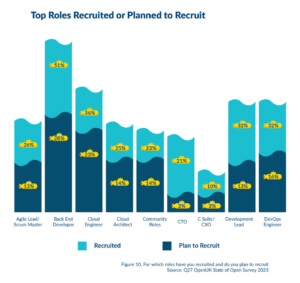
OpenLogic’s 2023 State of Open Source Report [13] identifies a lack of skills, experience and proficiency in Open Source around the world suggesting that there are opportunities for skilled workers. The challenges cluster around three areas: challenges with Open Source infrastructure technologies, support challenges with Open Source frameworks and support challenges with Open Source data technologies. Personnel experience and proficiency plague all of these areas as well as the need for specialised skills. Training, collaboration and sharing experience are areas where organisations can help to reduce the skills challenge. Experts who know data technologies and contribute upstream to Open Source are in high demand.
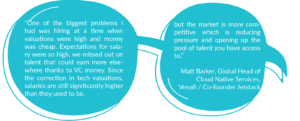
The increase in hiring and need for skilled workers is echoed in the Linux Foundation’s 2023 State of Tech Talent Report [14] , suggesting that 57% of organisations are adding workers this year despite the downturn in tech over the past few years [15] . The demand for skilled tech professionals remains strong, particularly in emerging areas such as cloud, containers, cybersecurity, and AI/ML. As technology continues to advance and new domains emerge, the survey data highlight the essential need for ongoing skill development to ensure that organisations remain competitive in the ever-evolving tech industry.
The report suggests that although some high-profile companies have experienced layoffs, there is still a focus by these companies on hiring developers and IT managers, with an emphasis on training and upskilling. Many organisations are investing in training programs for their existing technical staff due to the shortage of experts in key technologies like Kubernetes and Generative AI.
Civo’s 2022 White paper on The Kubernetes State of Play [16] considered the views of 1,000 cloud developers across Europe and North America. It echoes this Kubernetes talent shortage with 77% of the respondents agreeing that there is indeed a significant shortage of those with practical experience with Kubernetes. Despite this, the report notes that 63% of respondents agree that the value of real-word experiences with Kubernetes outweighs formal qualifications for candidate evaluation and a positive shift in the Kubernetes industry regarding staff and knowledge is highlighted. Ultimately, the goal would be to enhance the skills of IT professionals and simplify the complexities of the platform to maximise its benefits from modern IT as there is already an improvement in how much staff is getting familiar with Kubernetes [17].

3.4 Types of Collaborations as Benefit of Open Source Software
Real world skill development in Open Source Software is largely a result of collaboration, peer learning and peer problem-solving. Higher skill level and knowledge sharing can reduce risks and vulnerabilities in the software too, as developers can build relationships of trust to support each other.
Respondents in the OpenUK 2023 survey, for the third year running, placed collaboration as one the main benefits of Open Source Software [18] . This year, around one-third (66%) told us that they collaborate with other teams in the same organisation (inner source), 42% with corporate enterprises, and 39% with non-competitors using an Open Source licence. Among respondents, there was 9% that does not collaborate with other organisations, slightly higher than the 6% response we got on non-collaboration in the 2022 OpenUK survey. [19]
3.5 The Public Sector need – skills and curation
The importance placed on collaboration in the data collected from the survey indicates the need to work across organisations and sectors to develop and enhance not only production but also understanding and best practices. The unforeseeable pace of adoption of Open Source Software has not been met with a pace of understanding. This means its implementation and use which does not come neatly packaged with a vendor in many cases requires skills to be developed in house or bought in to ensure it is well curated. Those skills – both technical, and governance and compliance, are required to appropriately manage risk. Risk has shifted from contract to policy and process in this free to use digital world where code is brought into organisations without engaging legal, procurement or finance.
For example, as The World of Open Source: Europe Spotlight 2023 [20] published by the Linux Foundation suggests, we need to address sector-specific challenges to bring everyone along. Public sector organisations are struggling to unlock the value of Open Source and it is not just a matter of waiting for the sector to catch up because the dynamics between the economics of the public sector and those of the private sector organisations are very different. As a result, they have a different relationship with Open Source. Understanding the sector-specific challenges will help to create a more inclusive community.
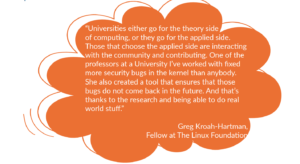 As we have seen across three years of OpenUK’s reporting, the UK public sector is failing to fully capitalise on Open Source. Although several Open Source first consumption and creation policies have been put into place and the number of public sector-funded projects is increasing, there is still limited inner source activity, indicating a lack between public sector organisations and a clear contribution policy. Given the significant potential benefits of Open SourceSoftware in the public sector, there is a clear requirement for a fundamental change in culture and policies that only require sharing code, clearly overlooking many of the valuable advantages that Open Source can provide [21] .
As we have seen across three years of OpenUK’s reporting, the UK public sector is failing to fully capitalise on Open Source. Although several Open Source first consumption and creation policies have been put into place and the number of public sector-funded projects is increasing, there is still limited inner source activity, indicating a lack between public sector organisations and a clear contribution policy. Given the significant potential benefits of Open SourceSoftware in the public sector, there is a clear requirement for a fundamental change in culture and policies that only require sharing code, clearly overlooking many of the valuable advantages that Open Source can provide [21] .
It is also apparent that the use of a minimal legal definition of Open Source requiring only that the legal aspects – sharing source on an Open Source Initiative approved licence – incode created is problematic. Not requiring well rounded open source software defined with practical considerations in terms of technical hygiene and governance such as building a community of contributors, including documentation, and plans for future development and maintenance to ensure well curated and secure Open Source Software, is creating code that is not usable or sustainable despite its technically being Open Source. This is indicative of a need to meet the requirements of good Open Source and the addition of detailed but usable procedures across the UK public sector.
3.6 Inbound talent, Brexit and Diversity of talent pool
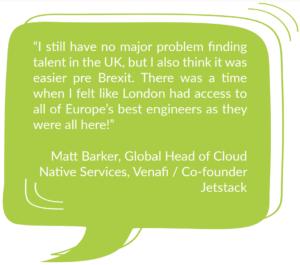
As every action has a reaction, so too the positive benefits of the internationalisation of Open Source businesses also bring challenges. The Open Source communities must be aware of these and ready to meet them.
Brexit led to an inevitable exit of a number of skilled engineers and members of the Open
Source communities. However, we are also now seeing talent take advantage of skills visas to become part of a thriving startup ecosystem in the UK, which inevitably includes those skilled in Open Source Software migrating into the UK.
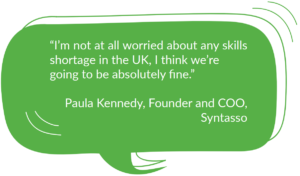 At this stage the available data collected on UK contributors does not provide a clear picture of the Equity, Diversity and Inclusion in the UK Open Source Software talent pool and community. OpenUK will be working over the next few years not only to capture the scale of community but also the data required to establish the levels of diversity of the UK’s contributing community and will include such data as it becomes available in its future skills reports.
At this stage the available data collected on UK contributors does not provide a clear picture of the Equity, Diversity and Inclusion in the UK Open Source Software talent pool and community. OpenUK will be working over the next few years not only to capture the scale of community but also the data required to establish the levels of diversity of the UK’s contributing community and will include such data as it becomes available in its future skills reports.
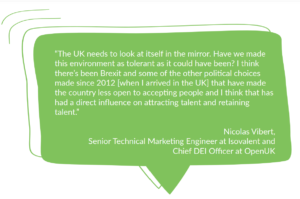
4. Thought Leadership
4.1 Thought Leadership: Understanding the ‘how’ of Open Source careers

Rebecca Taylor
Associate Professor and Director of the Work Futures
Research Centre, University of Southampton
Sustaining Open Source communities
Decades of academic research has grappled with understanding Open Source Software communities – from the hacker anthropologists of the 1980s and 90s, to the information systems theorists of the ‘noughts’ and ‘teens’. Studies addressing the long-term sustainability of Open Source communities have taken various approaches drawing on ideas from anthropology and sociology about gift exchange, community and networks, and from psychology on altruism. Often a central focus of the research has been to explore ‘why’ individual developers and engineers do Open Source work, what motivates them to contribute time and labour, especially when it might not be paid.
The problem with motive
The problem with asking people why they do something, what motivates them, is, as any anthropologist or sociologist knows, that reasons given tend to be shaped by social norms, and individualised. Ask a developer in an Open Source project why they are doing that work and they will say because they enjoy it or because it solves a particular problem they were grappling with. But this does not really tell us how to sustain it or why others are not doing it. ‘Why’ is not quite the right question.
The ‘how’ of unpaid work
The Sociology of Work offers a different set of questions for exploring open-source projects and communities and for understanding how to sustain them. These questions begin not with ‘why’, but with how? How is the work done? How do workers manage and organise the various tasks and jobs they navigate on a day to day, week to week basis? How questions reveal th complexity of people’s working lives beyond their paid work, (care, household labour, voluntary and community work, creative work, activism).
‘How’ is also an economic question. It makes visible the financial arrangements (salaries, student loans, pensions, benefits, financial support from spouses or parents) that sustain daily lives and underpin household divisions of labour.
Doing research on Open Source labour
The Web Science Institute at Southampton funded qualitative research on Open Source developer careers 22 . Twenty interviewees were purposively sampled from contributor ‘top tens’,community lists and GitHub profiles to capture diverse experiences including those of women and developers from the global south. They were relatively young (almost all were under 35) and with degree level education although some were self-taught in software development. They were working in various contexts from freelance, to startups, to nonprofits to global corporations. The 1 hour interview explored their careers from school through to the present and how they managed their Open Source work in relation to other work.
‘Hats’, ‘sidelines’ and ‘things’
Those we interviewed were all juggling various work activities; some paid and some not. One distinct group, the professional freelancers, had a portfolio of activities that included lucrative freelance gigs (consultancy work building websites, offering bespoke software solutions, and writing and speaking engagements) and building and contributing to Open Source Software projects. They talked about their work in terms of ‘the things that I do’, and ‘thing 1’ and ‘thing 2’. These tended to be mixed up together over the course of a working week or month.

Those who were formally employed were working for a range of organisations from global corporates to small and medium size software companies. Open Source work was part of the ‘day job’ although they were more likely to be using than contributing. However, many had what they called a ‘side-line’ or wore ‘other hats’ which involved contributing to Open Source projects and being active in communities on GitHub outside their paid work time.
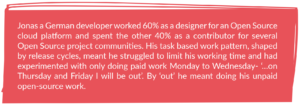
Divisions of labour and resources
The developers managed a wide variety of different arrangements of paid and unpaid work including microfinance schemes like Patreon or Github sponsorship although this was mostly a minor contribution to the household. Their various income streams supported their unpaid contributions and time had to be managed accordingly. Several had flexible work arrangements which mean that paid and unpaid work forms were more integrated during the week The unpaid work also in various ways supported the paid work providing skills development and an online CV that brought freelancers new clients and employed developers, new jobs.
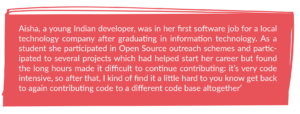
The impact of life course events such as changes in employment, migration, and family responsibilities tended to reshape their working life and the arrangement of paid and unpaid work. Developers with young children for example noticed a reduction in their Open Source work.
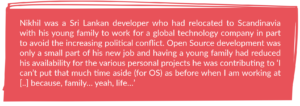
Understanding sustainability
Looking at the ‘how’ of Open Source Software careers is key to understanding sustainability. These snapshots reveal some of the challenges and barriers to building and sustaining Open Source projects and communities.
They raise questions about skills, how these are developed over the working life of a developer and the role unpaid work plays in that.
More fundamentally ‘how’ questions help explore the practical parameters of new models of work – work futures – in which for example ‘sidelines’ and ‘things’ might be supported by the state via an individual basic income. Or where commercial organisations might mainstream support for Open Source via reduced working hours or flexible working arrangements and non profit partners. The role of organisations in Open Source sustainability is crucial and more research is underway that examines that. [23]
4.2 Thought Leadership: Unlocking the Power of Tech

Matt Barker
Global Head of Cloud Native Services,
Venafi / Co-founder Jetstack
It’s almost a cliche these days to say you have imposter syndrome, but as a non-engineer in a deeply technical industry, I sometimes feel embarrassed to look at a teammate’s coding terminal, and for my mind to go blank.
On other days, I like to tell myself that this is a benefit. Because I’m not drawn into the argument about whether Rust is better than GO, I can focus on what matters – whether the customer actually cares or not.
Honestly, I never wanted to get into ‘IT’ as a kid, and was negatively affected by the perception of a boring, desk-based job in a basement represented by people like Simon from The Office or Maurice from the IT Crowd.
But, as most of you know, times have changed. It’s ‘tech’ now, not ‘IT’, and nerds like Mark Zuckerberg make a Billion dollars look cooler than a million [24] . Regardless of what you do, and the industry you are in, your future is going to be driven by tech. Whether that’s down to the internet, automation or AI, humans who can use IT to their advantage will outcompete those that don’t.
Although that’s a fact, the ability for many in the UK to capture that advantage is still fraught with difficulty. In my work as Entrepreneur in Residence for OpenUK, experience has told me that there is no consistent path to technical success.
As OpenUK’s Entrepreneur in Residence I led research amongst the UK’s Open Source founders and aspiring Founders. A number of aspiring founders I spoke to warned of a dearth of practical ways to learn how to code or, more generally, to learn about tech. Like myself, many of them got into it ‘by accident’ after picking up a raspberry pi, or being introduced to Github by a friend.
This is a problem. Even more so for women [25] and for those from disadvantaged backgrounds and certain ethnicities [26] . Fortunately, we have some tailwinds to work with. The UK is seen as a great place to do business, with the legal framework to back it up, and it benefits from a perception of being a hotbed for technical talent thanks to our strong education system and history of scientific invention. Recent OpenUK surveys also show that the UK has a disproportionate positive impact on open source contribution.
We’re also seeing some encouraging trends in the numbers of people getting into tech. Since 2011, acceptances into computer science courses [27] have risen by almost 50%, and we’ve seen an eye watering 400% increase in acceptances for students wishing to go on to study Artificial Intelligence courses at university.
So, the potential we have is there, but how do we unlock it? I don’t have all the answers, but here are some ideas inspired by my own research with OpenUK and recent attendance at industry events:
Enable basic digital access to all, regardless of location or economic status.
The earlier we can get people in the country productive with technology, the more chances we create for engineering success, and diversity of engagement. Bill Gates was able to create Microsoft because he was one of a handful of incredibly fortunate people in the 70s who got access to a computer for hours at a time at his university. By simply getting technology into the hands of people that may not otherwise have it, we increase the chances of finding the next Bill Gates, or at least move the needle on those awful figures on the number of women and disadvantaged people in tech.
Grassroots projects like the Raspberry Pi (and in the 80s the BBC Micro programme) do wonders for building excitement and passion around technology. Combine initiatives like this with stronger and faster internet in every part of the country, and you can’t help but get better outcomes with engagement.
Democratise technology through education in Open Source Software
The thing that’s amazing about Open Source is that you can get access to the code for free, you can engage with it straight away, and you can build the next billion dollar company on it from your bedroom. It’s also the foundation of the internet, the AI movement, and the phone you have in your pocket. The not so great thing about it is that it’s an incredibly large, complex and scary thing to engage with!
We must make Open Source as easy as possible for young people to understand and engage with. This will only come from educating people about the benefits of it, and in providing practical ways for them to get involved. Instead of people finding it ‘by accident’ we need to be driving more programmes around getting started with Linux, being introduced to Github or delivering coding challenges that fire the imagination.
I don’t believe the UK lacks the raw talent, but we certainly lack an ability to develop that talent [28], and Brexit has certainly made engineers and founders from abroad think twice [29] about coming to the UK to build their career or start a tech business, especially given increased competition from hubs like Berlin and Paris. All of this strengthens the need for us to create a systematic way to develop and nurture our talent.
Get commercial
Sadly, once Brits do realise the potential of their ability to commercialise technology, the first place they look is across the Atlantic, citing access to capital [30], liquidity [31], or a lack of support [32] and backing for start-ups in the country. There’s no doubt that we should continue to strengthen our partnership with, and learn from our American cousins, but the UK’s lack of ability to fund and scale tech businesses is a real problem. The more people who succeed in tech and stick around to build in the UK, the more we’ll be able to use their knowledge and resources to foster new companies.
The UK has many advantages: a stone’s throw to Europe, English as the international business language, a strong financial centre, and a deep history with India and China – likely to become the next tech powerhouses.
None of what I’ve talked about should surprise anyone, but given the UK’s economy has faltered in recent years, our manufacturing industry has reduced, and we’ve seen a slip in our place as the world’s financial hub, we will need to create more jobs.Tech is a place where we can make up the difference.
More than that, our future security may depend on our ability to ramp up technical skills. The wars of the future will not be ‘hot wars’ or ‘cold wars’, they will be ‘cyber wars’. Global cyber attacks increased by 28% in 2022 [33] and, as seen in the Russia / Ukraine war, technology is playing a much more important role in a country’s ability to defend themselves thanks to Starlink, Drones and AI [34] . If we can leverage some of the momentum we’ve got and play to some of our natural strengths, I think we have the opportunity to develop an international home for tech, one that has the ability to build, lead and protect.

5. The Role of Open Source Software in the UK tech Sector
5.1 Why does the UK create brilliant people but has not built an effective tech sector?
The UK is recognised globally as a centre for innovation and the producer of highly educated and skilled engineers, who are employed globally by the tech sector.

The level of engineering and development skills of course must increase to keep pace with increasing demand. This has led to talent flight in some cases. Phase Two identified that the UK had not produced the same scale of commercially skilled individuals in particular in product development and go to market strategy. For UK companies with US investment or which are acquired by the US these skills are often provided from individuals in the US. The flow of highly skilled engineers has therefore not been matched by commercial skills.
A steady flow of UK founded companies have received investment from the US historically, in particular in Open Source which has been less understood in the UK market. Many UK founded companies have also been acquired by large tech companies in the US before they can scale and this has inhibited the growth of more successful UK companies in their home territory.
The UK has failed to recognise much of the Open Source business talent both in terms of companies founded in the UK and the UK-based workforce which sits under the radar as part of the global tech sector without a local geographic focus or anchor but despite this 27% of 2022 Tech Sector GVA was demonstrated to be generated by that sector from the UK. Engaging with this submarine will be crucial to the success of a future UK tech sector.
5.2 What makes the US Successful?
In Phase Two of this report it was evident that the US success comes primarily from a few geographical areas, particularly the Bay Area, where groups of highly trained individuals gather – often around universities teaching engineering. Those universities teach a broader range of skills and entrepreneurship to software engineers. The broader skills beyond engineering are more freely available. Whilst many individuals home-work there is a proximity of talent to attend meetups and to learn from each other.
The depth of knowledge and deep understanding of particular technologies, including Open Source Software – generally infrastructure, or the plumbing and plumbers tools, allows for
investment to be made at scale due to an increased understanding of risk, enabling risk decisions to be made on a calculated basis.
Not only has the appetite for risk been seen to be stronger in the US but so too is the acceptance of failure, which is often seen as a ‘badge of honour’. The maturation of the UK approach to risk would likely enhance its success..
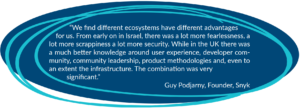
Additionally for many tech businesses, the US is the primary sales market and time zone differences often mean the local population is less keen to home-work for non-US companies.
5.3 UK Skills gap and reliance on the US
The UK is increasingly focused on tech skills and a shift from key sectors like finance which were the traditional go-to for top UK graduates, with tech becoming a more desired career pathway. Whether UK universities are keeping pace with the US education system in teaching commercial is questionable and it is desirable for more commercial skills be taught, to fill the gaps around product development and go to market strategies in particular, but more broadly to enable UK businesses to scale using the talent and skills of the UK workforce.
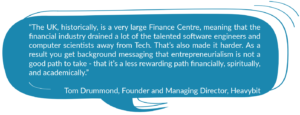
For Open Source businesses a larger talent pool with the right skills will facilitate their growth. A shift in focus in education to the most popular languages like Go and Rust as well as Python and a more practical focus in tech (IT or computer science) education is needed. This is true from primary to tertiary education and will enable the broader group beyond those interested in coding to participate in the tech sector, which in a digitalised world permeates all sectors and jobs.
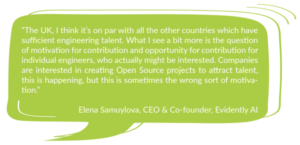
5.4 The advantages of and need for suitable Geographical Hubs in the UK
There are clear advantages of a talent pool being focused around geographic hubs in the US and some evidence of this in the UK around the University of Cambridge in particular.
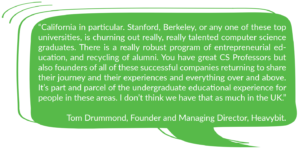
Developing Hubs for the UK is already in flight, funded by the UK government across the UK. These must also focus on Open Source to enable mentoring and engagement of new contributors to Open Source projects. Home workers also benefit from time with their networks and for new entrants to Open Source Software, making their first contributions to code bases, community management etc, access to individuals with experience and others contributing to Open Source Projects will be invaluable.
5.5 The Potential for UK Growth through Open Source Software Skills
To meet its challenge of building a future Tech Sector the UK must:
• Fill the gap in the UK talent pool’s business skills left by acquisitions and currently starving the UK of business skills needed to commercialise its innovation
• Retain the talent that often takes flight to the US and stem emigration by supporting the development of these skills in the UK and encourage skilled worker immigration
• Train people in the right engineering and dev skills which it currently is not and give practical experience.
Open Source Software can facilitate this:
• Individuals with skills but no experience will be able to gain hands-on experience by contributing to Open Source projects based on the coding languages they know, in bleeding-edge areas and which are used by international companies. Note contributions are not just code but also things like community organisation, translations, etc.
• Contributions by those individuals build a living CV on public repositories like GitHub and Gitlab where their skills development can be seen by the world
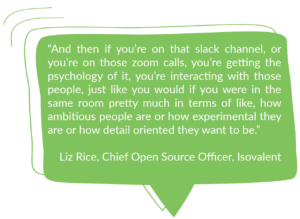
•Companies which use the code in the projects are also often participating in those projects, are generally users of its outputs and employ people who contribute based on those visible contributions to projects, hiring on a remote-working global basis based on skills.
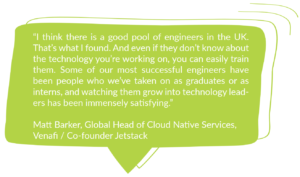
• Individuals can not only gain the practical skills they are missing from contributing but may also obtain their first job and then go on to build international tech careers without leaving the UK. In fact without leaving where they chose to live even if it is a rural area so long as there is connectivity to allow them to participate in this ecosystem geared towards home working
• They will also have opportunities to travel as part of the global tech sector, attending sprints, conferences and project meetings like All Hands, across the globe.
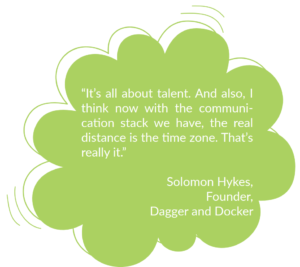
Potential impact to the UK:
• Increase individuals’ skills via hands on experience as opposed to simply being taught to code, thereby converting the educated to a skilled talent pool in the UK available to work in tech
• Enable career development with highly skilled senior tech sector employees being based in the UK and employed across the globe – more Liz Rices and Mike Mcquaids
• Increase number of highly skilled individuals who may found future businesses who have cut their teeth from the UK in international software development who will go on to found their own businesses – more Alexis Richardsons and Matt Barkers
• Stem talent flight
• Increases to the amount contributed to the UK economy by remote working individuals employed internationally in Open Source Software
• Increase the number of UK based tech businesses that scale here
All of this must of course be accompanied by encouraging immigration of talented individuals to the UK.
5.6 Remote Working
The skills required to remote work are standard in Open Source and taught by contribution to Open Source Software projects as part of the organisation of the communities and dispersed collaboration.
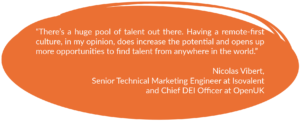
A combination of these skills and good connectivity which is finally in place across the UK enables this opportunity for the UK.
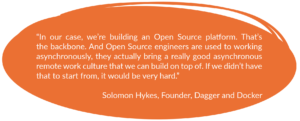
5.7 International employment
Many in the UK’s Open Source Sector work for international employers and the job market for UK based individuals with the right skills is global and not inhibited by geographical boundaries.
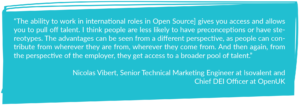
Open Source companies in particular hire based on skills not location.

Building more of those skills and a larger UK based talent pool will lead to greater international employment opportunities and more cash flow into the UK economy, whilst enabling individuals the choice to remain in the UK.

5.8 Connectivity and impact on rural locations

The ability to command an international tech salary in a rural location in the UK requires the right technical skills and experience, the ability to connect – i.e. good connectivity – and the ability to travel, so good connections. Location is not relevant, although there are benefits to access to local Hubs and mentorship in these locations.
5.9 Culture and Employment
With access to digital tools connecting the world today there is no barrier to the young who are learning their skills or to those re-training to participate in Open Source. Age is no inhibitor to contribution, and the Open Source culture is diverse and run around Codes of Conduct and Respect which enable a diverse population to be welcomed as contributors. Whilst a digital device and connectivity are needed there are few financial barriers to contribute.
6. Case Study
6.1 Case Study: Cloud Native Computing Foundation
 Chris Aniszczyk
Chris Aniszczyk
Chief Technology Officer
Cloud Native Computing Foundation
Part of the Linux Foundation, the Cloud Native Computing Foundation (CNCF), is a prominent leader in Open Source with over 850 participating organisations, including the world’s largest public and private cloud companies. It uses an Open Source Software stack to deploy applications as microservices, packing each part into its own container. Ahead of the curve, CNCF brings together industry bodies and experts to create a collaborative platform that supports knowledge sharing and the development of Open Source adoption. In a candid conversation with Chris, their CTO, we spoke about how organisations collaboratively can better shape the culture and skills with the Open Source world.
Why do we need to expand Open Source skills?
The world of technology, along with its workforce is forever changed; most of the tech we rely on in our daily lives is powered by Open Source software, be it ordering a meal or listening to a song – almost everything we use these days touches a CNCF project and is using Kubernetes behind the scenes. As Chris says, “Our biggest need in our community from our member companies is a need to hire people – there’s a skill shortage when it comes to cloud native talent, especially talent that understands multi clouds.” Because of the demand of the sector, CNCF has invested in certification and training programs to help people grow. In this way, people don’t have to have the strongest engineering or formal computer science background, the training allows you to get started by understanding basic Linux skills as a baseline. Even with foundational skills, you immediately have an opportunity to change your whole career trajectory as jobs in Open Source are in high demand.
Building a community: shaping today’s workforce
CNCF has taken the lead in shaping the workforce of the tech sector as it offers online programs, webinars, live streams, certifications, and detailed training. As Chris says, “The market for cloud native skills is just huge, and so under-served. I get a call every couple of days from a company complaining that they can’t hire folks, so we’re trying our best to train the next generation of cloud developers.”
CNCF offers training and certifications for everyone, regardless of background, means or knowledge. The best way to gain practical pragmatic skills is to contribute to Open Source projects. The CNCF mentoring program allows anyone to join and be mentored by a professional. In this program, participants “get paid a stipend to work three months and to contribute and be mentored by a professional, resulting in great opportunities. Everyone that goes to this mentorship will get a job offer or they get an internship offer. So the options are there. People just need to know about them and take the opportunity.” He points to the experience of a chef from Indonesia who had little computing experience apart from video games. “It took six months of training and he was able to change the trajectory of his career.”
6.2 Civo
 Kunal Kushwaha
Kunal Kushwaha
Developer Relations Manager
Cloud Native Computing Foundation
Based in Stevenage, Hertfordshire, Civo, a community led cloud native service provider reliant on Kubernetes, enables companies to host core applications in an easy, affordable and secure way. Civo isn’t just a Kubernetes platform, it’s a community formed by over 40 experts from across the globe, all with the shared vision of simplifying the use of Kubernetes and increasing its adoption.
Beyond the institute
Kunal completed his degree in Delhi, India, and believes that universities alone do not equip people to be a strong part of the Open Source workforce. Ideally, you need a mix of on the ground of active contribution experiences and university theoretical knowledge. As Kunal says, “it depends on the University, although in the end, it is important to think outside the box. Don’t be confined to your university curriculum, it’s important but get out of your comfort zone and try to do things externally. Like learning a new tech stack building project, contributing to Open Source , going to events, networking, people speaking at events, organising events, doing community work, whatever you want to do.”
An Open Source driven workforce
For Kunal, being a technology driven company is a privilege that allows you to work from anywhere – for example you can freelance, work remotely, or in-person jobs. In addition, being a remote company opens various opportunities for Civo to create a globally representative workforce, including creative minds from the UK, US, India, Bangladesh, Singapore and Malaysia. A commonality identified by Kunal is that everyone on the team is an active contributor to Open Source.
As he shares, “When I was hired at Civo, I got discovered by my Open Source contributions, which is the same pattern for many other engineers. We believe that the best way to find people is by Open Source.” Open Source contributors have impressive resumes that highlight their skills, projects, relevant experiences and networking abilities. As Kunal says, “In my experience I’ve seen people contributing to an Open Source project behind the company and getting hired by the same company, there are many such examples.” Gaining project-based experience while job hunting is invaluable when applying for roles.
UK specific lens
Your environment shapes your Open Source contributions, experiences and skill development. The UK is a great place to promote, develop and grow Open Source skills. Its unique location allows individuals to work with anyone across the globe, as Kunal says,

7. Conclusion
 Dr Jennifer Barth,
Dr Jennifer Barth,
Founder and Research Director,
Symmetry and CRO, OpenUK
From government initiatives to private enterprises, the surfacing of Open Source Software has been driven by the need for cost-effective, flexible, and collaborative technologies. The slow recognition of the role of Open Source has, in turn, heightened the demand for skilled professionals who can navigate and contribute to the Open Source ecosystem. It is that term ‘navigate’ that is important here: developers, administrators and maintainers are in demand.
Regardless of what role you play in this, it seems clear that those who learn to contribute and be part of the Open Source ecosystem are also particularly adept at working in the Open Source style. As Mike McQuaid puts it, “that style is flexible, self-sufficient and successfully asynchronous”. More than that, it is collaborative and able to communicate across time zones and disparate work flows. Remote work was not new for those in Open Source when the world went pandemic-led remote working – but the lack of meet ups, ways to communicate and overarching pressures of a global crisis made everyone have to adjust to a time where the meaning of ‘real-world’ experience changed.
In an attempt at realignment – some businesses are moving to only in-person work to regain the benefits of face-to-face community while others are deepening and expanding their workforce by drawing from any point in the world, as long as the skills offered are exactly what they need. Open Source has always relied on the ability to bring global teams together face to face to supplement their remote working capabilities with personal relationships that bond teams. It creates a mix of skilled dispersed workers who can be locally even rurally based anywhere in the world that offers adequate connectivity but who also have all the benefits of being part of the bleeding edge tech innovation driven from the Bay Area, and the opportunity to travel the world to build relationships with their colleagues.
‘Contributors’ and ‘Maintainers’ come in all shapes and styles. This report highlights those people, to surface the UK-based talent pool and the opportunities – for both employers and employees – that this work allows for the future of UK tech. People are finding that employers are looking to Open Source activity to identify potential employees. Employers are looking at what individuals contribute, how they interact, and what they are talking about in making hires. In the world, the activities, both formal job tasks and informal off-the-side-of-the-desk contributions and commits to particular projects, are visible and help to fuel employment opportunities.
With the help of GitHub, Runa Capital and EPAM data we have been able to begin the process of highlighting how individual actions and contributions have big impacts.
As of the end of Q3 2023, there were 31,800 UK-based developers who had made at least one contribution that had been accepted into open source projects (commits). In the past 12 months, those making their first commit increased by 1,800; those making 3 plus commits increased by 900; those making 10 plus commits increased by 600; those making 100 plus commits increased by 100; those making 500 plus commits increased by 100; and those making 1000 plus commits increased by 53. The contributions are growing at a healthy pace – and these numbers are likely bigger than they appear due to the limitations of location data.
This report is dedicated to making these contributors visible – to show the massive and committed talent underpinning the digital economy and to surface the Open Source Submarine.
The ebb and flow in the software and digital labour market since 2021 has further complicated the skill demand landscape. Despite this, programming skills emerge as the most sought after area of recruitment, indicating a resurgence of employment opportunity and, of course, a notable shift towards the importance of AI/ML skills reflecting the shifts in AI and the digital opportunity. The emphasis on training and upskilling existing technical staff speaks to the industry’s recognition of the critical need for ongoing skill development. Many in this report note the need for the best possible education but also emphasising the value of real-world experiences. Collaboration remains a cornerstone of success in Open Source Software and there is certainly a need to spotlight equity, inclusivity and diversity in the industry, where past research has shown the number of female participants to be as low as 10-17% [35] .
There is much debate on the actual nature of the ‘skills gap’. Possibly a deeper understanding of what precisely the UK is missing would shed light on the validity of the gap. The influx of venture capital into UK-based tech startups and scaleups, although beneficial for the economy, has contributed to a unique challenge: the potential draw of skilled professionals away from the UK due to access to funding or buyers from the United States. It is important to retain talent through government and immigration schemes to create an environment that fosters the growth of necessary skills. Individuals with skills but lacking practical experience can gain hands-on exposure by contributing to Open Source projects.
his not only allows them to work on cutting-edge technologies used by global companies but also builds a comprehensive public profile as a visible testament to their skills development. Remote working continues to be a viable option for those wanting to remain in the UK but work for international companies. The potential impact of leveraging Open Source contributions is significant. It can increase contributions to the UK economy by individuals employed internationally, foster cutting-edge skills within the domestic talent pool, and cultivate a cohort of individuals with UK roots in international software development. This not only addresses the immediate skills shortage but also lays the foundation for future entrepreneurs who may go on to found and lead innovative tech ventures.
Embracing Open Source participation not only offers a practical solution to the current skills gap but also holds the promise of transforming the UK into a breeding ground for globally competitive tech talent while simultaneously nurturing homegrown entrepreneurship.
8. Formalities
8.1 Contributors
Amanda Brock, CEO, OpenUK
Amanda Brock is CEO of OpenUK the UK. She is an appointed member of the Cabinet Office’s Open Standards Board; the Advisory Board Member Mimoto; and European Representative of the Open Invention Network. A lawyer of 25 years’ experience, she previously chaired the Open Source and IP Advisory Group of the United Nations Technology Innovation Labs; sat on the OASIS Open Projects, Initiative; was a Member of the British Computer Society Inaugural
Influence Board; and of the UK Government Energy Sector Digitalisation Task Force Advisory Board; as well as being an elected Board Member of the Open Source Initiative. Formerly General Counsel of Canonical for 5 years from 2008 she set up and ran their legal function and has been part of the Open Source community since.
Amanda is a judge in the IDG Foundry CIO 100 2023 having been a Judge in the We are Tech Women Rising Star Awards 2020-22.Listed as the 37th Most Influential Woman in UK Tech by Computer Weekly in 2023 and in Computing’s IT Leaders 100 2023, she is again included in the 2023 Involve HERoes list of 100 global women executives driving change by example. She is shortlisted for the Women In Tech Excellence Awards Role Model of the Year and Hero of
the Year categories for 2023. In 2022 she was awarded the Lifetime Achievement Award in the Women, Influence & Power in Law Awards UK 2022.
Amanda writes regularly for the tech press and is the editor of Open Source Law, Policy and Practice (2nd edition) published by Oxford University Press in October 2022, with open access thanks to the Vietsch Foundation https://amandabrock.com/books/.
Amanda Kamin, Chief Marketing and Communications Officer, Digital Catapult
A senior corporate reputation specialist with 20 years’ marketing and communications experience, Amanda Kamin is Chief Marketing Communications Officer for Digital Catapult. Having worked in international organisations (Motorola, Visa Europe and VisionFund) and within the UK public sector (Food From Britain) both in agency and in-house roles, she has broad experience across a range of markets and audiences. Amanda is skilled in multichannel oversight,
leadership communications and quality content generation.
Amanda’s previous role in VisionFund International’s Senior Executive Team, gave her a deep understanding of the impact of funding for fledgeling startups as she supported World Vision’s microfinance arm across 30 markets.
Elena Samuylova, CEO and Co-Founder, Evidently AI
Elena is a CEO and Co-founder at Evidently AI, a Y Combinator-backed startup developing open-source tools to evaluate, test, and monitor the performance of machine learning models. She has been active in the applied machine learning space since 2014. Previously, she co-founded and served as a CPO of an industrial AI startup. She worked with global metal and chemical companies to implement machine learning for production optimization. Prior to that, she led business development at Yandex Data Factory, an enterprise AI division of Yandex. She focused on delivering ML-based solutions to retail, banking, telecom, and other industries. In 2018, Elena was named 50 Women in Product Europe by the Product Management Festival.
Greg Kroah-Hartman, Fellow at The Linux Foundation
Greg Kroah-Hartman is among a distinguished group of software developers who maintain Linux at the kernel level. In his role as a Linux Foundation Fellow, he continues his work as the maintainer for the Linux stable kernel branch and a variety of subsystems while working in a fully neutral environment. He also works closely with Linux Foundation members and projects, and on key initiatives to advance Linux.
Greg created and maintains the Linux Driver Project. He is also currently the maintainer for the Linux stable kernel branch and a variety of different subsystems that include USB, staging, driver core, tty, and sysfs, among others. Most recently, he was a Fellow at SUSE.
Greg is an adviser to Oregon State University’s Open Source Lab and a member of The Linux Foundation’s Technical Advisory Board. He has delivered a variety of keynote addresses at developer and industry events, and has authored two books covering Linux device drivers and Linux kernel development.
Guy Podjarny, Founder, Snyk
Guy is the Founder of Snyk, the leading Developer Security platform, helping developers secure as they build. Guy was previously CTO at Akamai, co-founded Blaz.io (acquired by Akamai), and was the product manager of AppScan, the first AppSec scanner, through Sanctum, Watchfire and IBM. Guy is a public speaker, O’Reilly author, and an active early stage angel investor.
Ian Massingham, Chief Marketing Officer, Aiven
Ian Massingham leads Marketing at Aiven as CMO. Aiven is the Open Source Data Platform for everyone, and provides an integrated data platform supporting the most popular and widely adopted Open Source data infrastructure software to over 1000 customers in more than 90 countries around the world.
Prior to joining Aiven, Ian led Developer Relations at MongoDB, and before this he spent more than eight years in marketing and marketing leadership roles at Amazon Web Services, where he was part of the team that helped to establish AWS as the most popular global cloud computing provider.
Dr Jennifer Barth, Founder and Research Director, Symmetry and Research Director OpenUK
Jenn has more than 15 years of experience leading independent research on the intersections of emerging technologies and socioeconomic change. She provides companies with independent thought leadership and media engagement opportunities on global issues impacting and shaping our current and future technical-social lives.
Her work spans the digital through to social and economic change. She has looked at sustainability, workforce skills and organisational competitiveness strategies through and beyond the pandemic with Microsoft and many other big and small organisations and works as the Chief Research Office researching the role of Open Source Software and its potential to fuel the circular economy with OpenUK.
She has experience working on the human impact of artificial intelligence (AI) through fieldwork experiments with IBM Watson, Microsoft and other providers. She is skilled at blending research methods and working with people to bring to life the stories behind numbers. Dr Barth earned her DPhil in Geography from the University of Oxford.
Kunal Kushwaha, Developer Relations Manager, Civo
Kunal is empowering communities via open-source and education. He finds passion in teaching and has taught thousands of folks online and in person. He is a developer relations manager at Civo, CNCF Ambassador, TEDx speaker and a GitHub Star. He is the founder of WeMakeDevs and also started the official Cloud Native Student Community group joined by thousands of folks, focussed on getting more young people involved in the ecosystem. In the past he has been a track chair of the KubeCon + CloudNativeCon, Major League Hacking Coach and a Google Summer of Code mentor.
Liz Rice
Liz Rice is Chief Open Source Officer with eBPF specialists Isovalent, creators of the Cilium Cloud Native networking, security and observability project. She is the author of Container Security, and Learning eBPF both published by O’Reilly, and she sits on the CNCF Governing Board and on the Board of OpenUK. She was Chair of the CNCF’s Technical Oversight Committee in 2019-2022, and Co-Chair of KubeCon and Cloud Native Con in 2018.
She has a wealth of software development, team, and product management experience from working on network protocols and distributed systems, and in digital technology sectors such as VOD, music, and VoIP. When not writing code, or talking about it, Liz loves riding bikes in places with better weather than her native London, competing in virtual races on Zwift, and making music under the pseudonym Insider Nine.
Matt Barker, Global Head of Cloud Native Services, Venafi / Co-founder Jetstack and OpenUK Entrepreneur in Residence
Matt is passionate about how Open Source can be used as a driving force for value and innovation. Having spent his entire career working for Open Source start-ups, including Canonical and MongoDB he went on to start one of his own, Jetstack.Jetstack began as a bootstrapped Kubernetes service provider, and helped all manner of companies from small start-ups to large enterprises. In the process of spotting gaps around Kubernetes, they created the Open Source cert-manager project which has thousands of Github stars and is downloaded more than a million times a day. Jetstack was acquired by Venafi in 2020, the leader in machine identity management. Matt now runs their cloud native services business and continues to explore cutting edge technologies in the Open Source ecosystem.
Mike McQuaid, CTO and Co-Founder, Workbrew
Mike McQuaid is the CTO and Cofounder of Workbrew. Previously, he spent a decade at GitHub, improving the internal developer and open source maintainer experiences. Outside of work, he is the project leader of the Homebrew package manager (which he has maintained for 14 years), author of “Git in Practice” (an intermediate Git book) and writes and speaks about open source, engineering career development, remote work, and empathy in tech on his site, podcasts and conferences.
Nicolas Vibert, Senior Technical Marketing Engineer, Isovalent
Nico Vibert is a Senior Technical Marketing Engineer at Isovalent – the company behind the open-source cloud native solution Cilium. Nico has worked in many different roles – operations and support, design and architecture, technical pre-sales – at companies such as HashiCorp, VMware and Cisco. Nico’s focus is primarily on network, cloud and automation and he loves creating content and writing books. Nico regularly speaks at events, whether on a large scale such as VMworld, Cisco Live or at smaller forums such as VMware and AWS User Groups or virtual events such as HashiCorp HashiTalks. Outside of Isovalent, Nico’s passionate about intentional diversity & inclusion initiatives and is Chief DEI Officer at the Open Technology organisation OpenUK.
Paula Kennedy, Co-Founder, COO, Syntasso
Paula is Co-Founder and Chief Operating Officer of Syntasso; her previous roles include Senior Director of Tanzu Global Education at VMware, Senior Director of Platform Services EMEA at Pivotal and Co-Founder & Chief Operating Officer of CloudCredo. Working in the IT industry for over 20 years, Paula is passionate about community, diversity and inclusion and has a range of speaking experience including DevOpsDays, DevOps Enterprise Summit, Velocity Conference, QCon and the LeadDev conference. Paula is part of the organising committee for Kubernetes Community Days UK and DevOps Days London, and also organises the London Platform User Group.
Rebecca Taylor IFHEA
Rebecca Taylor is an Associate Professor, Sociologist of work and organisations at the University of Southampton and co-director of the Work futures Research Centre. Her research interests are in unpaid work, digital labour and public service delivery with a focus on policy and practice. A central strand of this work is on Open Source labour and the organisational context to open source software development.
Dr Rebecca Rumbul, Executive Director and CEO, The Rust Foundation
Rebecca is the Executive Director and CEO of the Rust Foundation, a global non-profit stewarding the Rust language, supporting maintainers, and ensuring that Rust is safe, secure, and sustainable for the future. She holds a PhD in Politics and Governance, and has worked as a consultant and researcher with governments, parliaments and development agencies all over the world, advocating for openness and transparency, and developing tools to improve digital participation. In addition to her full-time and consultancy roles, Rebecca is a Non-Executive Director and Council Member for the UK Advertising Standards Authority, and a Trustee of the Hansard Society.
Solomon Hykes, Founder Docker, and Founder and CEO Dagger
Solomon is the co-founder and CEO of dagger.io, the first fully programmable CI/CD platform. Previously, he was the co-founder of Docker, where he served as CEO for 5 years, then CTO for another 5 years. Solomon grew up in France and started Docker in a cellar in Montrouge, in the suburbs of Paris. Due to lack of funding, he left France in 2010 to join the YCombinator incubation program. In 2013, Docker united the Cloud industry around a new standard that is now ubiquitous: the container. Solomon now lives in San Francisco
Tom Drummond, Founder and Managing Director, Heavybit
Tom is the managing director of Heavybit, and has more than 20 years of experience investing in developer-first enterprise infrastructure startups and helping them scale operations, finance, and GTM. He currently works with successful devtool startups such as Snyk, LaunchDarkly, Netlify, and CircleC.
8.2 About the Creators of this Report
8.2.1 OpenUK
As the UK’s organisation for the business of Open Technology – Open Source Software, open hardware, open data, and increasingly open ai, implemented through open standards and open innovation our Purpose is UK Leadership and global collaboration in Open Technology.

OpenUK has a unique focus as a country organisation with this breadth of Open Technology. This arises partly from the breadth of its focus and recognition of the need to amalgamate the “Opens” in a future facing tech sector.
Also unique is the breadth of its activities which is not currently reflected in other country organisations in this space as can be seen in our Mission:
Community: Convene the UK’s Open Technology community to harness its power;
Legal and Policy: Lead and advocate for the use and development of Open Technology; and
Learning: Encourage education and skills for all in Open Technology.
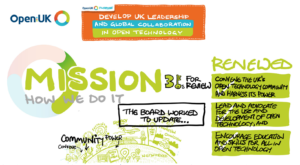
Our third unique factor is that OpenUK’s focus is on people not companies. OpenUK is not a traditional membership organisation but reinvents this model.
Of course our home grown companies – the normal focus of Open Source country organisations – are important to OpenUK and many participate in our work. We also recognise the importance of the global companies employing much of our remote-working, UK-based, Open Technology workforce.
Our focus on people is important to us, to our sector and to a better understanding of it as a whole. People and their skills and talent are a fundamental basis of all technology. The founders interviewed for this report reiterate and emphasise this through their interviews. People are not only the users but the creators of tech.
As is borne out by our research, there are a significant number of UK-based workers who form part of a globally-dispersed Open Source workforce, and an equally significant UK leadership in this sector. This workforce, and its impact on the economy and UK tech sector is often missed domestically. They form the subject matter of this Part Three of our 2023 State of Open Report.
Open Source has been the “Submarine under the Digital Economy” for many years. The internet, cloud, blockchain, AI, and importantly our national digital infrastructure are all built on it.
OpenUK’s reporting allows this “force of open”, to “up periscope” and share their value with you.
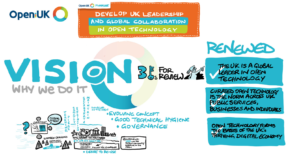
Within our Policy remit we have worked in partnership with Symmetry for 3 years, researching to build ground breaking reporting specific to Open Source Software [36]. This research allows the boundaries to be pushed and the importance of the Values of “Open” to be clarified for all.
OpenUK is not a pay to play organisation and is funded by Sponsorship, Donations and Grants. We are grateful to our many sponsors and partners who make our work possible [37].
All are welcome to participate.
Contact OpenUK on admin@openuk.uk

8.2.2 Symmetry

Symmetry looks beyond the surface and behind the curtain of the fundamental innovations and trends shaping our society, markets, culture, and values. We are academics and researchers looking at the intersections of emerging technology and socioeconomic impact, producing independent research for thought leadership and business solutions.
Symmetry’s mission is to share and grow knowledge about the interaction of technology and everyday lives. We want to understand the past, present, and future of human interaction with emerging technologies and socioeconomic changes—from behaviour to context, nature to nurture, origin to experiences—helping our clients engage their clients and public imagination.
8.2.3 Runa Capital

Runa Capital is a Luxembourg-based global venture capital firm, focusing on enterprise software, deep tech and fintech startups. Since 2010, we have invested in more than 100 European and US startups, including over ten Open Source companies.
Runa’s early-stage investments include cloud banking platform Mambu ($5.5B last round valuation), Open Source web server Nginx (acquired by F5 for $700 million), cloud ERP vendor Acumatica (acquired by EQT) and quantum computing company Pasqal.
Runa has supported UK startups like Zopa, DigitalGenius, Chattermill, Evidently AI and Lumai. Its London-based general partner Konstantin Vinogradov focuses on AI and Open Source Software.
8.3 Methodology
The research used a mixed method approach to explore and demonstrate the state of Open Source Software in relation to skills and security in the UK. Interviews were conducted with industry leaders, founders and Open Source Software experts and included as case studies and thought leadership.
The research used a proximity sampling for the third annual OpenUK survey, receiving a total of 339 answers. Response collection took place in June 2023. Out of the 339 answers, sorting for those coming from UK based organisations (the focus of the research), there were 244 by participants from across the UK, representing all sectors of the economy. All percentages reported have been rounded, and where replies were fewer than 3 we have aggregated replies where possible to control for disclosure. Responses came from all over the UK, and those from abroad (16%) were filtered out.
Out of those, the headquarters of the organisations of more than 2⁄3 (69%) are in the UK, while 31% reported that their organisation has headquarters overseas.
All percentage figures are rounded for simplicity therefore their sum may not always be equal to 100%. Where the number of answers was too low, we have either aggregated categories or omitted them, as appropriate, to ensure that no data leads to disclosure.
For the full information of the survey population, please refer to The State of Open Phase 2.
8.4 Acknowledgements
The research was led by Dr Jennifer Barth, CEO and Research Director at Symmetry and OpenUK’s Chief Research Officer in partnership with Amanda Brock, CEO OpenUK in 2023. Thank you to our team of economists, psychologists, data scientists and social scientists to all who contributed, and in particular our designer Zin Nwe Zaw Lwin, and Dr Dora Kokosi. We are grateful to the 339 individuals who participated and provided us with essential data in our 2023 survey.
8.5 References
Civo White Paper. (2022). The Kubernetes State of Play 2022. A Civo white paper into the challenges and opportunities of Kubernetes in 2022. Retrieved from: https://www.civo.com/kubernetes-state-of-play-2022
GitLab. (2021). A maturing DevSecOps landscape. 2021 Global Survey Results. Retrieved from:https://about.gitlab.com/images/developer-survey/gitlab-devsecops-2021-survey-results.pdf
Huggings, M. (2023). How Open Source Software is transforming public sector culture as well as digital services. Retrieved from: https://www.openaccessgovernment.org/open-source-software-transforming-public-sector-culture-digital-services/150350/
ONS. (2022). Annual Population Survey – regional – employment by occupation (SOC2020), UK. Retrieved from: https://www.nomisweb.co.uk/datasets/aps218/reports/employment-by-occupation?compare=K02000001
OpenLogic. (2023). The 2023 State of Open Source Report. Open Source Usage, Market Trends, & Analysis. Retrieved from: https://www.openlogic.com/resources/2023-state-open-source-eport#:~:text=About%20the%20State%20of%20Open%20Source%20Report&text=The%20report%20details%20open%20source,for%20organizations%20of%20all%20sizes
OpenUK. (2021). State of Open: The UK in 2021. Phase One. March 2021. Retrieved from: https://openuk.uk/stateofopen/state-of-open-the-uk-in-2021/
OpenUK. (2021). State of Open: The UK in 2021. Phase Three “The Values of Open”. October 2021. Retrieved from: https://openuk.uk/stateofopen/state-of-open-the-uk-in-2021/
OpenUK. (2021). State of Open: The UK in 2021. Phase Two: UK Adoption. July 2021. Retrieved from: https://openuk.uk/stateofopen/state-of-open-the-uk-in-2021/
OpenUK. (2022). State of Open: The UK in 2022. Phase One: The Open Source Journey. July 2022. Retrieved from: https://openuk.uk/stateofopen/state-of-open-the-uk-in-2022/
OpenUK. (2023). State of Open: The UK in 2023. Phase One, “A year in review”. April 2023. Retrieved from: https://openuk.uk/wp-content/uploads/2023/04/REPORT.pdf
OpenUK. (2023). State of Open: The UK in 2023. Phase Two, Part 1 “Show us the Money – The Economics of Open Source Software”. Retrieved from: https://openuk.uk/wp-content/up-loads/2023/07/FINAL-State-of-Open-The-UK-in-2023-Phase-Two-Part-1.pdf
OpenUK. (2023). State of Open: The UK in 2023. Phase Two, Part 1 “Show us the Money – The Economics of Open Source Software”. Retrieved from: https://openuk.uk/wp-content/uploads/2023/07/FINAL-State-of-Open-The-UK-in-2023-Phase-Two-Part-1.pdf
OpenUK. (2023). State of Open: The UK in 2023. Phase Two, Part 2 “Show us the money – AI Openness” Retrieved from: https://openuk.uk/wp-content/uploads/2023/07/FINAL-State-of-Open-The-UK-in-2023-Phase-Two-Part-2.pdf
Technation. (2022). People and skills report 2022. Exploring tech jobs, careers, and transformation in the UK. Retrieved from: https://technation.io/people-and-skills-report-2022/#tech-job-vacancies
The Linux Foundation. (2022). World of Open Source: Europe Spotlight 2022. Exploring the State of European Open Source Innovation, Opportunities, and Challenges. September 2022. Retrieved from: https://www.linuxfoundation.org/research/world-of-open-source-europe-spotlight
The Linux Foundation. (2023). 2023 State of Tech Talent Report. Acquiring and Retaining Technical Talent in 2023. May 2023. Retrieved from: https://project.linuxfoundation.org/hubfs/LF%20Research/LF%20Training%20State%20of%20Tech%20Talent%202023%20-%20Report.pdf?hsLang=en
The Linux Foundation. (2023). World of Open Source: Europe Spotlight 2023. Exploring the State of European Open Source Innovation, Opportunities, and Challenges. Retrieved from: https://www.linuxfoundation.org/blog/world-of-open-source-europe-spotlight-2023-why-it-matters-and-what-it-reveals
8.6 OpenUK Survey 2023
You can find the survey at https://openuk.uk/stateofopen
It, like the content of this report is available for re-use with attribution.
8.7 Sponsors
We are grateful to our Report Sponsors GitHub and Civo and our in-kind sponsor Dark Matter for producing the OpenUK Documentary [38] , and to OpenUK’s general Donors and Sponsors who can be found at https://openuk.uk/donors/ . Our Donors and Sponsors do not approve or disprove of our content.
8.8 Cover Photos
Cover photos are from our collaborator photographer Tiana Lea, who took 38 portraits for the OpenUK State of Open Exhibition sponsored by Arm 39 , and has since taken a further almost 200 portraits at State of Open Con and our Honours list event. We are grateful to Arm for their continued support of this work and will continue to document the people forming the Open Technology community in this way.
Individuals on the front cover of Phase Three: Carla Gaggini; Liz Rice, Chief Open Source Officer, Isovalent; Dr. Rebecca Rumbul, Executive Director and CEO, Rust Foundation; Mandy Chessel, Founder, Pragmatic Data Research Ltd.; Dominique Top, Solutions Architect at GitLab; Sal Kimmich, Director of Open Source, Escher Coud; Pooi Ling Cheong, Open Source Program Office Lead, Lloyds Banking Group; Katie Gamanji, Senior Kubernetes Field Engineer, Apple; Matt Jarvis, Director of Developer Relations, Snyk; Andrew Martin, Founder and CEO, Control Plane; Ruth Cheesley, Project Lead, Mautic; Sam Hepburn, Head of Global Communities, Snyk; Sami Atabani, VP, IP Licensing.
With thanks to our sponsors

Thanks to the State of Open: Skills or Bust Documentary makers


Footnotes
2. OpenUK’s Survey as shared in State of Open: The UK in 2023 Phase Three, Economics
3. The Runa team used GitHub API to collect data on all active repositories with 1000+ stars and all contributors who ever committed to these repos.Then they applied GoogleMaps and ArcGIS geocoding services to automatically recognise countries based on locations specified in users’ profiles (if any).They then filtered out only users with 1000+ commits and manually checked location recognition.Ambitious locations (e.g. “Italy / UK”) were attributed to the UK and users with clear non-UK locations were removed from the list.All UK-based contributors were then manually checked. Runa created a real time database of commits across 1+, 3+, 10+, 500+, 1000+ and more commits for the UK.
4. youtu.be/SNOHJf97uQU?si=-3ixBth-AU8zRvu7
5. The issue was addressed using the OpenStreetMap API, which helped filter out incorrect locations. The location is associated with the Github account, not the commit author, which can be misleading in some cases.
6. EPAM’s methodology included an algorithm to determine if the commit author is related to the UK. First, filter push events by GitHub accounts from the UK and then build an OSCI Ranking based on commits from the filtered push events. The result is the top 20 companies with contributions, and within that the number of UK-based contributors. While the solution has its limitations, it goes some way to illustrate the number of contributors in the UK.
7. ONS. (2022). Annual Population Survey – regional – employment by occupation (SOC2020), UK.
8. Technation. (2022). People and skills report 2022. Exploring tech jobs, careers, and transformation in the UK.
9. Technation. (2022). People and skills report 2022. Exploring tech jobs, careers, and transformation in the UK.
10. OpenUK. (2023). State of Open: The UK in 2023. Phase Two, Part 1 “Show us the Money – The Economics of Open Source Software”.
11. The OpenUK “State of Open: The UK in 2023” survey was distributed in June 2023 and collected 339 responses, out of which 244 were participants across the UK representing all sectors of the economy.
12. GitLab. (2021). A maturing DevSecOps landscape. 2021 Global Survey Results.
13. OpenLogic. (2023). The 2023 State of Open Source Report. Open Source Usage, Market Trends, & Analysis.
14. The Linux Foundation. (2023). 2023 State of Tech Talent Report. Acquiring and Retaining Technical Talent in 2023. May 2023.
15. Based on responses from US, Canada, Europe, India and other locations, Feb – March 2023
16. Civo White Paper. (2022). The Kubernetes State of Play 2022. A Civo white paper into the challenges and opportunities of Kubernetes in 2022.
17. Huggings, M. (2023). How Open Source Software is transforming public sector culture as well as digital services.
18. OpenUK. (2021). State of Open: The UK in 2021. Phase One. March 2021 ; OpenUK. (2021). State of Open: The UK in 2021. Phase Two: UK Adoption. July 2021 ; OpenUK. (2021). State of Open: The UK in 2021. Phase Three “The Values of Open”. October 2021 ; OpenUK. (2022). State of Open: The UK in 2022. Phase One: The Open Source Journey. July 2022.
19. OpenUK. (2022). State of Open: The UK in 2022. Phase One: The Open Source Journey. July 2022.
20. The Linux Foundation. (2023). World of Open Source: Europe Spotlight 2023. Exploring the State of European Open Source Innovation, Opportunities, and Challenges.
21. The Linux Foundation. (2022). World of Open Source: Europe Spotlight 2022. Exploring the State of European Open Source Innovation, Opportunities, and Challenges. September 2022.
22. https://workfutures.southampton.ac.uk/blog/open-source-labour-rewards-motivations-and-careers/
23. https://workfutures.southampton.ac.uk/projects/beyond-organisational-boundaries-open-source-digital-infrastructure-in-the-delivery-of-products-and-services-research-study/
24. www.youtube.com/watch?v=k5fJmkv02is
25. https://www.stemwomen.com/women-in-stem-percentages-of-women-in-stem-statistics
26. https://www.stem.org.uk/sites/default/files/pages/downloads/Science%20Education%20in%20England_%20Gender%2C%20Disadvantage%20and%20Ethnicity.pdf
27. https://educationhub.blog.gov.uk/2021/02/09/more-young-people-are-taking-stem-subjects-than-ever-before/
28. https://www.google.com/url?q=https://www.retailbankerinternational.com/news/the-uk-position-as-a-global-tech-hub-suffers-due-to-lack-of-tech-talent/?cf-view&sa=D&source=docs&ust=1700346109812373&usg=AOvVaw2Sexh2rbe9OOudbGVjrBS3
29. https://sifted.eu/articles/is-uk-losing-pull-for-foreign-founders
30. https://www.theguardian.com/business/2022/aug/30/raising-money-is-difficult-british-startups-finding-it-harder-to-access-funding
31. https://www.uktech.news/news/industry-analysis/london-liquidity-us-ipo-uk-tech-lead-20230529
32. https://sifted.eu/articles/uk-investment-falls-off-cliff-government-drags
33. https://www.securitymagazine.com/gdpr-policy?url=https%3A%2F%2Fwww.securitymagazine.com%2Farticles%2F98810-global-cyberattacks-increased-38-in-2022
34. https://techinformed.com/one-year-on-10-technologies-used-in-the-war-in-ukraine/
35. https://www.linuxfoundation.org/research/the-2021-linux-foundation-report-on-diversity-equity-and-inclusion-in-open-source
36. “Open Source Software” is used throughout this report as a capitalised term to mean software where the source code is freely shared and the code is made available on an Open Source Initiative approved licence. However we recognise that this is more than a legal definition and the additional value of “Curated” Open Source Software – code with contributions, collaboration, community and good technical hygiene and governance all form a necessary part of “Open Source Software.”
37. https://openuk.uk/participants/sponsors/


